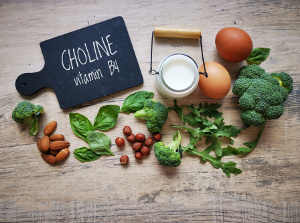Choline helps prevent Alzheimer’s disease
 Choline is one of the B vitamins and is necessary for our central nervous system, energy turnover, lipid metabolism, and many other functions. It appears to be a somewhat forgotten nutrient, and science now links choline deficiency to Alzheimer’s disease and cardiovascular diseases, according to a study that is published in the journal Aging Cell.
Choline is one of the B vitamins and is necessary for our central nervous system, energy turnover, lipid metabolism, and many other functions. It appears to be a somewhat forgotten nutrient, and science now links choline deficiency to Alzheimer’s disease and cardiovascular diseases, according to a study that is published in the journal Aging Cell.
Originally discovered in 1998, choline is considered an essential nutrient and belongs to the family of B vitamins. The body is able to synthesize small amounts of choline in the liver but not enough to undertake all the different functions. Choline is found in foods with natural fats, especially egg yolk, offal, meat, fish, dairy products, legumes, and kernels. Choline supports the following functions in the body:
- Fetal growth and brain development
- Conversion of carbohydrates, fats, and protein into energy
- Normal liver function
- Uptake and transportation of lipids
- Synthesis of acetylcholine, a neurotransmitter that is involved in the formation of neurons, synapses, muscle control, learning, and memory
- Synthesis of betaine that is involved in the conversion of homocysteine into methionine. This function is very important because too much homocysteine in the blood can damage the circulatory system and stress our cells
- Choline is also a component of lecithin, a phospholipid that is the main structural component of cell membranes.
Choline prevents Alzheimer’s disease
As described, choline is important for our cell membranes, circulatory system and central nervous system, which are all vital for our brain health and cognitive skills. The scientists behind the new study wanted to investigate if a deficiency of dietary choline can increase the risk of Alzheimer’s disease, which is the leading cause of dementia and comes with a huge socio-economic price tag.
The scientists conducted their study on mice that were either given a standard diet or a choline-free diet from they were 3-12 months of age. The diet without choline resulted in the following changes:
- Weight gain
- Impaired motor skills
- Impaired glucose metabolism
- Pathological changes in the liver and cardiovascular system
- Pathological changes in the hippocampus that is important for our memory and sense of direction
- Increased levels of proteins in the brain (amyloid, plaque, and tau) that are involved in the development of Alzheimer’s disease
- Changes in proteins in plasma that are important for insulin metabolism, fructose metabolism, mitochondrial function, and inflammation
The researchers conclude that dietary choline intake is important for preventing a number of systemic and pathological organ functions, including lowering markers of Alzheimer’s disease.
- People who eat low-fat diets or strictly plant-based diets risk getting too little choline
Choline requirements and widespread deficiency problems
There is no official dietary recommendation for choline intake, but it is expected to be included in the new and revised edition of the Nordic Nutrition Recommendations. The European Food Safety Authority (EFSA), however, does recommend that pregnant and breastfeeding women get 480-550 mg of choline daily because of their increased need for the nutrient. Nonetheless, only seven percent of pregnant women in Europe get enough choline. According to the Food and Nutrition Board, the American equivalent of the EFSA, adults need 425-550 mg of choline daily to prevent liver damage. In the US, around 90 percent of the population gets too little dietary choline, and the same is probably the case in other Western countries. Choline is also available in supplement form.
References:
Nihil Dave et al. Dietary choline intake is necessary to prevent system-wide organ pathology and reduce Alzheimer’s disease hall marks. Aging cell. 2023
Christian Vejlund. Cholin: det glemte næringsstof. Ernæringsfokus. 14 marts 2023
Search for more information...
- Created on .








